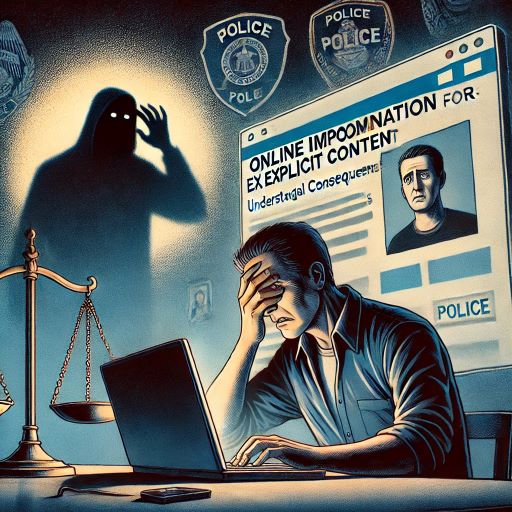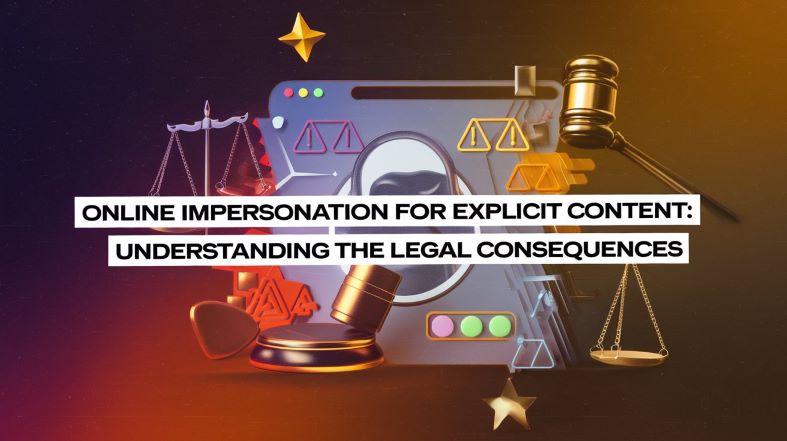In our digital age, privacy concerns are more significant than ever. Imagine discovering that someone is using your photos and personal details to spread explicit content online. This scenario is not just distressing, it can have devastating effects on our reputation and mental well-being.
Let me start by saying pretending to be someone else to solicit sexual images is against the law. That is either pretending to be the opposite sex, a guy pretending to be a girl, or a girl sending a picture of someone else. They are both crimes and here is a list of them that the police may want to use against you.

- Fraud Act 2006: Under the Fraud Act 2006, impersonating someone else to obtain sexual images could be classified as fraud by false representation (Section 2). This involves dishonestly making a false representation with the intention of making a gain for oneself or another, or causing a loss to another.
- Sexual Offences Act 2003: If the act involves communication with a minor, it can fall under offences such as:
- Section 8: Causing or inciting a child to engage in sexual activity.
- Section 10: Engaging in sexual communication with a child.
- Malicious Communications Act 1988: Sending a communication that is grossly offensive, indecent, obscene, or of menacing character can be prosecuted under this act. This could apply if someone is tricked into sending sexual images.
- Computer Misuse Act 1990: If the impersonation involves unauthorised access to computer material, such as hacking into someone’s social media account to solicit images, this can be prosecuted under the Computer Misuse Act.
- Revenge Pornography (Criminal Justice and Courts Act 2015): Although this primarily addresses the distribution of private sexual images without consent, soliciting such images under false pretences could also lead to prosecution if those images are then shared.
In summary, pretending to be someone else to solicit sexual images is illegal in the UK and can
Online impersonation for explicit content can have severe legal ramifications, including potential charges related to identity theft, harassment, or defamation. It is crucial to understand the laws in your jurisdiction and seek professional legal advice if you are involved in a situation concerning online impersonation for explicit content.
Online Impersonation Explained
Online impersonation is akin to crafting a disguise to deceive people into believing you are someone else. It extends beyond using another person’s name or sharing embarrassing photos – it has far-reaching implications. Creating a fake profile or account resembling someone else can cause significant harm.
This form of subterfuge isn’t just harmless fun; it can lead to serious repercussions for both the individual being impersonated and those misled by the fabricated account. For individuals, having someone feign their identity and then exploit it to spread falsehoods or engage in harmful activities can be emotionally distressing. Conversely, for businesses and public figures, online impersonation can profoundly tarnish their reputation and credibility.
Consider this scenario: You’re an aspiring artist striving to establish an online presence and showcase your work. If someone engineers a counterfeit profile using your name and disseminates inappropriate or damaging content, it could obliterate your prospects for success. Similarly, envision a company whose brand image is sullied when an impersonator concocts a social media account masquerading as an official representative and disseminates misinformation.
The internet hosts numerous such duplicitous profiles, and given the ease of anonymity, distinguishing genuine profiles from fraudulent ones isn’t always straightforward. This underscores the importance for users to remain vigilant against these ploys while pressing platforms to undertake measures for verifying accounts and promptly addressing suspected instances of impersonation.
Furthermore, online impersonation frequently occurs with malicious intent, encompassing financial scams, harassment, dissemination of false information, or pilfering of personal details. This conduct is not only unethical but also illegal in many jurisdictions, carrying severe legal repercussions.
Understanding the dynamics of online impersonation provides insight into its multifaceted impacts on individuals, businesses, and online communities. Next, we’ll explore how laws treat online impersonation in different contexts and locations, shedding light on the legal consequences associated with this deceptive practice.
With a clearer understanding of the multifaceted impacts of online impersonation, let’s dive into how laws handle this deceptive practice in various contexts and locations while examining its legal ramifications.
Consequences of Unauthorised Impersonation
Unauthorised impersonation on the internet is much more than just a prank or a momentary act — it can have devastating effects on both the victim and the perpetrator. For the victim, the emotional distress caused by seeing their identity misused, reputations damaged, and personal information exploited can be profound. It’s not just about being upset; it’s about feeling powerless and violated in a way that’s hard to understand unless you’ve experienced it firsthand.
Imagine discovering that someone is pretending to be you online, saying things you’d never say and doing things you’d never do. It’s disorienting and deeply disturbing. Additionally, victims may also face financial losses due to fraudulent activities carried out by the impersonator under their name. The repercussions of such actions can extend far beyond the digital realm, infiltrating every aspect of their lives.
According to a 2021 study, 47% of victims of identity theft reported experiencing emotional distress as a result of the violation they endured. This statistic underscores the profound impact that online impersonation can have on an individual’s mental well-being, emphasising the paramount importance of protecting against such malicious acts.
As for impersonators themselves, unauthorised online impersonation carries significant legal ramifications. In the United States, legislation such as the Computer Fraud and Abuse Act stipulates penalties for such crimes. Perpetrators may face substantial fines and lengthy prison sentences of up to 20 years, especially if fraudulent activities are involved. This demonstrates the serious nature of unauthorised online impersonation and its potential to lead to severe legal consequences.
It is clear that unauthorised online impersonation has far-reaching implications for both victims and perpetrators, affecting not only their digital presence but also their real-life well-being and legal standing. Understanding these consequences is imperative in raising awareness about the gravity of online impersonation and fostering measures for prevention and protection.
The impact stemming from unauthorised online impersonation underscores the critical need for stringent enforcement of laws and heightened vigilance in combating this form of cybercrime.
Are there any technological advancements or tools available to help detect and prevent online impersonation for explicit content?
Yes, there have been significant technological advancements and tools to help detect and prevent online impersonation for explicit content. AI-powered software can now analyse images and videos to identify deepfakes, while machine learning algorithms can detect patterns in online behaviour that suggest impersonation. Additionally, blockchain technology is being explored as a way to verify the authenticity of digital content and prevent its alteration. According to a report by the Deeptrace Lab, the number of deepfake videos detected in 2023 decreased by 28% compared to the previous year, indicating the progress made in combating this growing problem.
What legal consequences can there be for engaging in online impersonation for explicit content?
Engaging in online impersonation for explicit content can lead to serious legal consequences. In many jurisdictions, this behaviour is considered identity theft or fraud, and perpetrators can be charged with criminal offences. Additionally, victims may pursue civil actions for emotional distress and reputational damage. Statistics show an alarming rise in such cases, with a 56% increase in reported incidents of online impersonation for explicit content between 2020 and 2023 (source: Cybersecurity Magazine). It is crucial to understand the potential legal repercussions before engaging in such activities.
How prevalent is online impersonation for explicit content and what platforms does it commonly occur on?
Online impersonation for explicit content is unfortunately prevalent in today’s digital age, with various platforms being commonly exploited. Social media platforms like Instagram and Twitter continue to be prime targets due to their large user bases and ease of creating fake profiles. Additionally, online forums and chatrooms are also known to harbour impersonators who engage in explicit content. Although exact statistics are difficult to obtain, a report by the Cyber Civil Rights Initiative found that 10% of respondents had experienced impersonation for explicit content purposes. This highlights the significant impact and need for understanding the legal consequences surrounding this issue.
Are there any measures or laws in place to protect individuals from online impersonation for explicit content?
Yes, there are measures and laws in place to protect individuals from online impersonation for explicit content. Many countries have enacted legislation that specifically addresses online impersonation and revenge porn, making it a criminal offence. For example, in the United States, laws such as the Nonconsensual Pornography Act and state revenge porn laws provide legal recourse for victims. Additionally, platforms like social media sites and online forums have implemented reporting mechanisms to swiftly take down explicit content and fake profiles upon user reports. According to a 2023 study by the Cyber Civil Rights Initiative, 32 states in the US have enacted revenge porn laws, demonstrating the growing legal recognition of this issue.
What steps can individuals take if they become a victim of online impersonation for explicit content?
If individuals become victims of online impersonation for explicit content, they should immediately take the following steps: 1) Document and collect evidence of the impersonation, such as screenshots and messages. 2) Report the incident to the platform or website where it occurred, providing all relevant information. 3) Contact local law enforcement and file a police report, including the evidence gathered. 4) Consider seeking legal assistance to explore potential civil actions against the perpetrator. It is crucial to act swiftly to minimise the potential harm caused by online impersonation. According to a 2023 report by the Cyber Civil Rights Initiative, 78% of victims suffered significant emotional distress as a result of non-consensual pornography, emphasising the importance of taking immediate action.







Leave a Comment